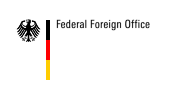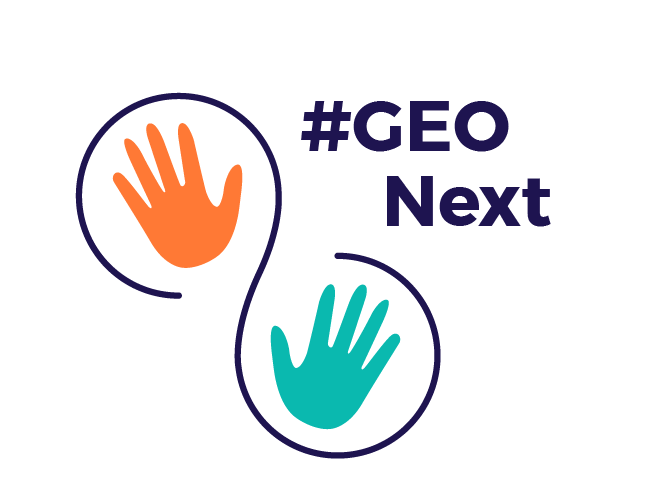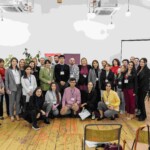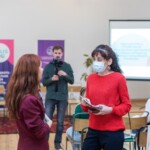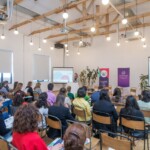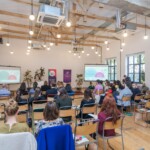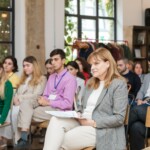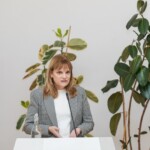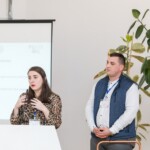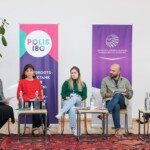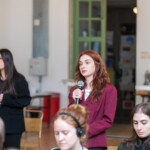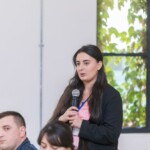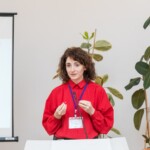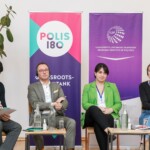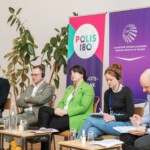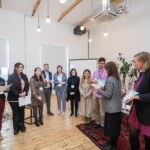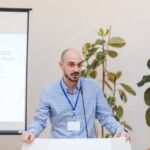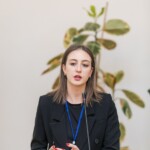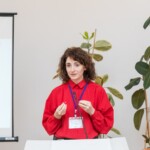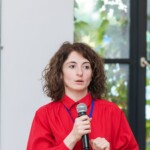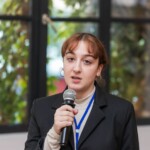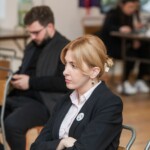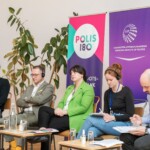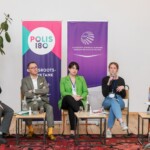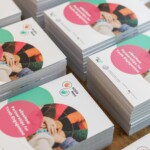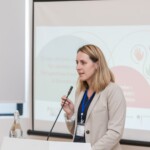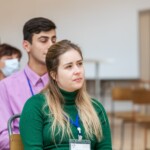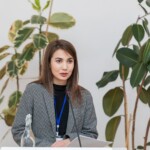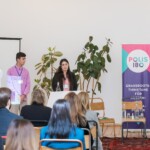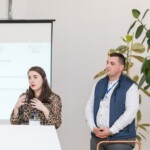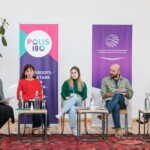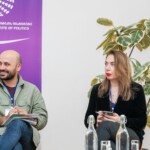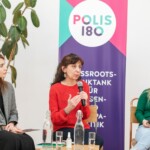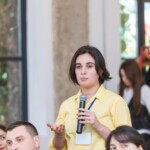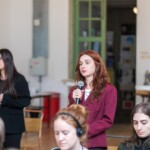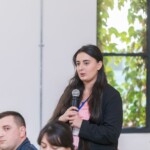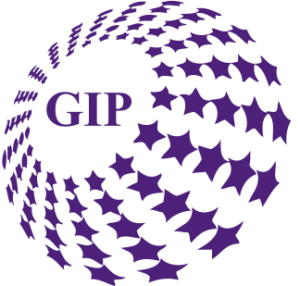
Logos (c) Leah Doellmann
Partnerships for Youth Engagement
In a series of joint projects, Polis180 and GIP have worked with young people in Georgia to identify challenges and solution approaches to civic engagement, resulting in a jointly drafted Youth Manifesto. Based on the Manifesto, several youth projects in all regions of Georgia have been supported and brought tangible change to the communities and activists involved. #GEONext – Partnerships for Youth Engagement brings together young activists from all over Georgia with international businesses and organizations, as well as young experts from Germany who have joint forces to tackle four specific societal challenges: Inclusion, Digitization, Climate Change/Sustainability, and Regional Economic Developments.
In a joint conference bringing together youth, civil society, businesses and politicians from Germany and Georgia, the groups present the project results and discuss them with international experts and representatives from diverse sectors. A joined publication reflects on the status quo of cross-sector cooperation in Germany, Georgia and beyond, provides hand-on tips and tangible best practice experiences, and showcases the #GEONext projects in different Georgian regions as examples for successful collaboration between civil society, businesses, international NGOs and local municipalities.
Sub-grant Projects
Detailed descriptions can be found here!
![]() Digitalization / Entrepreneurship
Digitalization / Entrepreneurship
Mentors
Learn more about our mentors here!
- Farid Askerov & Ketevan Maisuradze – polyvim LLC
- Giorgi Demetrashvili – Caritas Georgia
- Ida Bakhturidze – Women Engage for a Common Future (WECF)
- Mariam Zhorzhikashvili & Nino Khukhua, giz Georgia
- Nini Mosiashvili – Sweeft
- Irakli Chkhaidze – 8000 Vintages
Co-Mentors
Learn more about our co-mentors here!
- Jil Kaiser – BG3000 / Polis180
- Esther Kern – BIGS Potsdam / Polis180
- Jonas Nitschke – European Commission / Polis180
- Nora Pohl – Unionhilfswerk / Polis180
Publications
Cross-Sectoral Cooperation for Societal Change? Perspectives from Georgian Youth. Policy Paper by Frauke Seebass, Anna Kiknadze, Jil Kaiser, Esther Kern, Jonas Nitschke & Nora Pohl.
Blog Articles
#Youth4climatechange ways ahead: The EU green deal? Analysis by Jil Kaiser.
Digital transformation, youth engagement and cross-sectoral cooperation. Analysis by Esther Kern.
Sustainable and inclusive growth as the key to social cohesion and territorial parity in Georgia. Analysis by Nora Pohl.
Creating inclusive societies through cross sector cooperation. Analysis by Jonas Nitschke.
Reports
9 JUN | Kick-off Meeting with Georgian Ambassador to Germany H.E. Levan Izoria and Andy Coxall (Common Purpose)
21 OCT | #GEONext Conference on Cross-Sectoral Cooperation for Societal Change with distinguished guests and representatives
05 DEC | Final Event in Berlin on Cross-Sectoral Cooperation for Societal Change with distinguished guests and representatives
Events
- 8 June | Webinar by GIP organisation team on project management and administration
- 9 June | Official Project Kickoff with welcoming remarks by Ambassador of Georgia to the Federal Republic of Germany Levan Izoria
- 20 July | Webinar by Co-Mentors on youth engagement in German politics
- 10 June – 30 September | Implementation of project activities in the regions
- 13 Sep | Webinar on Cross-Sectoral Cooperation for Societal Change? Perspectives from Germany and Georgia (German and Georgian with simultaneous translation)
- 21 October | Cross-sectoral conference in Tbilisi to present the project results with welcoming remarks by First Secretary of the Ambassy of Federal Republic of Germany to Georgia Barbara de Tschaschell
- 05 December | Presentation of the project results and discussion on the role of youth in cross-sector cooperation for societal change in Berlin with Cultural Attachée to the Georgian Embassy Dudana Mazmanishvili
Project activities
While our activities have established active networks among young people willing to engage in local politics, it is also essential to link them to a broader civil society sector, including NGOs, private companies and the public sector. The aim of #GEONext therefore is to use civic education and international, cross-sectoral cooperation to prepare the next generation of Georgians to be engaged, know and exercise their democratic rights and responsibilities, harness technology, and build partnerships, including with the private sector, in order to demand and facilitate increased government accountability.
For this, we engaged mentors from various sectors, covering between them the four central topics of digitalization, inclusion, climate/sustainability and regional economic development. Through a targeted call for applications, two youth groups were selected for each topic (8 groups in total) and paired with these mentors. In addition to the mentorship, they receive funds to set up workshops, seminars or similar events in their respective regions to pass on the insights they have gained from their own local activism and working with the mentors.
Moreover, each group is matched with a German youth representative (co-mentor) selected in a separate process who will support them in organising the local events from a grassroots perspective. The project participants will implement their own initiatives, putting to practice the newly acquired knowledge, capitalizing on the mentors’ support and sharing gained experience with their peers.
Between June and September, the project teams will implement and documents their projects in the regions. In October, we will bring together the youth and their mentors with political decision makers, civil society actors and business representatives in a joined conference in Tbilisi to discuss their experiences and the importance of cross-sectoral cooperation to tackle societal challenges comprehensively.
Throughout the project duration, we will publish a number of blog articles to discuss the challenges and benefits of cross-sectoral cooperation in Georgia, Germany and beyond.
Our project partner
The Georgian Institute of Politics (GIP) is a Tbilisi-based non-profit, non-partisan, research and analysis organization founded in early 2011. GIP strives to strengthen the organizational backbone of democratic institutions and promote good governance and development through policy research and advocacy in Georgia. It also encourages public participation in civil society-building and developing democratic processes. GIP is working to distinguish itself through relevant, incisive research; extensive public outreach; and a brazen spirit of innovation in policy discourse and political conversation.
Our project staff

Frauke Seebass (Co-Project Lead, Polis180): Frauke is a a project manager and long-term member of Polis180 where she is active in the program Perspective East, working mainly on the Western Balkans and the countries of the Eastern Partnership in the framework of EU Neighbourhood and Enlargement Policy. At the same time, she is a PhD student at Andrássy University Budapest where she researches identity politics as a foreign policy instrument in Kosovo. Among others, she studied Peace & Conflict Studies and Linguistics in Germany, The Netherlands, and Israel. Frauke loves Georgian nature, wine and toasting culture and dreams of becoming a brilliant tamada one day.
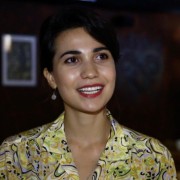
Anna Kiknadze (Co-Project Lead, Polis180): Anna has been a member of Polis180 since it’s launch. Currently she is actively engaged with the program Perspective East, focusing on the EU Neighbourhood Policy issues in the South Caucasus and the other Eastern Partnership countries. She holds an MA in European Studies from University of Bath, the UK. Prior to that, she studied in Georgia (BA International Relations from Free University of Tbilisi), Turkey and Germany. For the last 6 years Anna has been based in Berlin and among other governmental & non-governmental organisations, she worked at the German Institute for International and Security Affairs (SWP), Georgian Embassy in Germany and was an IPS fellow at the German Bundestag.
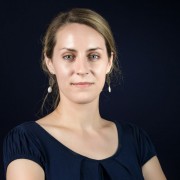
Renata Skardžiūtė-Kereselidze (Deputy Director, GIP): Renata is deputy director at Georgian Institute of Politics, where she worked since 2012. She is alumna of the On Think Tanks Fellowship Program “Integral Leaders for Global Challenges” (2017). Before joining GIP Renata has worked as a journalist covering foreign policy and European issues in Lithuania, and was recipient of Heinrich Boell fellowship to research EU strategies in conflict resolution in Georgia. Her interests include collective identities, European integration and Eastern Partnership. She earned her MA at Central European University (CEU), Nationalism Studies department (2009); and received BA in Political Science, Institute of International Relations and Political Science (IIRPS), Vilnius University (2008).
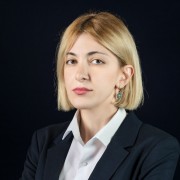
Salome Kandelaki (Project Coordinator, GIP): Salome is currently a Project Coordinator and Junior Policy Analyst at the Georgian Institute of Politics. Salome is a Ph.D. student in Political Science at Tbilisi State University. She is an invited lecturer at the European University, Georgia. In 2017, she obtained her MA degree in Political Science from the Central European University Budapest. At the same time, she was specialized in Comparative Politics. Moreover, she has a second Master’s degree in Public Administration (MPA) from the joint program of the German University of Administrative Sciences and Ivane Javakhishvili Tbilisi State University. Her previous work experience includes Fundraising Management at the Social Justice Center (former EMC). She was also a leading acting specialist at the Tbilisi City Assembly as well as project management in different youth non-governmental organizations. Her field of experience is comparative case-study analyses with a particular focus on religion and democracy, regionalism, and democratization. Among her research interests are Europeanization, frozen conflicts as well as secularism in Europe.
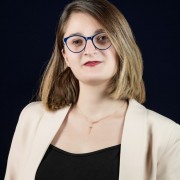
Nino Samkharadze (Junior Policy Analyst, GIP): Nino is is a Junior Policy Analyst at GIP. At the same time, she is a PhD student at Tbilisi State University, Department of Political Science. She has obtained MA degree in Nationalism and Ethnicity Studies from TSU and BA degree in International Relations from International Black Sea University (IBSU). Being an invited lecturer at IBSU she delivers courses in Introduction to Political Science and Nationalism in International Relations. Nino’s research interests include nationalism, identity politics and their influence on political processes in the post-Soviet region.ionalism, identity politics and their influence on political processes in the post-Soviet region.

Teona Zurabashvili (Junior Policy Analyst, GIP): Teona is a junior Policy Analyst at GIP. As a Swedish Institute scholar, she studied Master’s program in Political Science at Gothenburg University from 2018 to 2020 and gained MSc in Political Science. Besides, she has earned MA degree in International Relations from Georgian Institute of Public Affairs and BA degree in History from Tbilisi State University. In 2019, she was a research associate at Quality of Government Institute (Sweden), where she worked on corruption issues. Her main research interests include democracy, good governance, corruption, and political parties in transitional democracies.

Shota Kakabadze (Junior Policy Analyst, GIP): Shota is a Junior Policy Analyst at the Georgian Institute of Politics. He is a Doctor of Philosophy in Political Science from the University of Tartu (Estonia). Shota has obtained his Masters degree in the European Union – Russia Studies from the same university. During his doctoral studies he has been a Swedish Institute Research Fellow at Uppsala University Institute of Russia and Eurasian Studies, as well as a Junior Researcher of International Relations at the Johan Skytte Institute of Political Studies at the University of Tartu. His main research interest includes discourses on national identity, foreign policy, Eastern Partnership. He has published several academic articles and a book chapter on Georgian national identity/foreign policy relationship.
Project term
01 March- 31 December 2022
Funding & Support
The project is funded by the German Federal Foreign Office in the framework of the programme “Expanding Cooperation with Civil Society in the Eastern Partnership Countries and Russia”.

